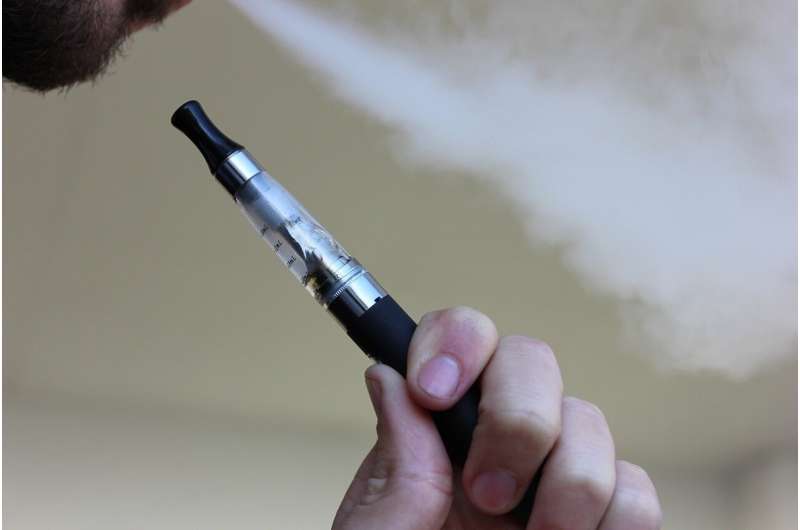Pilot study shows even short-term 'vaping' causes inflammation in non-smokers

E-cigarette (e-cig) use is rising at concerning levels among both smokers and non-smokers, and new research data suggests that even short-term e-cig use can cause cellular inflammation in never-smoker adults.
Researchers at The Ohio State University Comprehensive Cancer Center—Arthur G. James Cancer Hospital and Richard J. Solove Research Institute (OSUCCC—James) report the first evidence of biological changes correlated with e-cig use in never-smokers in the journal Cancer Prevention Research on Oct. 16 (online ahead of print).
Using a procedure called bronchoscopy to test for inflammation and smoking-related effects, researchers report a measurable increase in inflammation after four weeks of e-cig use (without nicotine or flavors). Although the magnitude of change was small compared with a control group, the pilot data suggests that even short-term usage can result in inflammatory changes at a cellular level. Inflammation from smoking is an important driver of lung cancer and other respiratory disease development.
Peter Shields, MD, senior author of the study and deputy director of the OSUCCC—James, says any level of cellular inflammation correlated with e-cig use is concerning because the biological and health effects of e-cig constituents such as propylene glycol and vegetable glycerine—while "generally regarded as safe" by the U.S. Food and Drug Administration (FDA) when used in foods and cosmetics—are unknown when heated and inhaled with e-cigs. Researchers note that even in this small study, there were observable effects.
"The implication of this study is that longer term use, increased daily use and the addition of flavors and nicotine may promote additional inflammation," says Shields. "The general perception among the public is that e-cigs are 'safer' than cigarettes. The reality is the industry is changing so fast ¬- and with minimal regulation—that usage is outpacing the rate of our scientific understanding. It's becoming a public health crisis we should all take very seriously from a general pulmonary health, cancer risk and addiction perspective. E-cigs may be safer than smoking, but that is not the same as safe, and we need to know how unsafe they are."
With the recent reports of lung disease and deaths associated with vaping, the effects of vaping nicotine and marijuana oils makes this research more critical.
For this pilot study, OSUCCC—James researchers recruited 30 healthy, non-smoking volunteers to directly assess the impact of tobacco and e-cig use on the lungs through bronchoscopy, an outpatient test in which a doctor inserts a thin tube through the nose or mouth to view the airways. A small sample of lung cells is collected from fluid in the lungs. Participants were randomized to a four-week intervention with e-cigs containing only 50% propylene glycol (PG) or 50% vegetable glycerine (VG) without nicotine or flavors. (PG and VG are used in e-cig devices.) Results from these tests were then compared to a separate control group of never-smokers. Researchers did not see levels of inflammation higher than the controls, but there was an increase in inflammation among the users who inhaled more of the e-cigs.
In August 2016, the FDA was granted regulatory authority over e-cig product design. Data about e-cig toxicity in humans is urgently needed to establish scientific evidence-based regulatory policies.
"Human clinical trials can provide valuable information regarding actual toxicant exposure and risk for disease. Through the randomized clinical trial of healthy never-smokers over a month, we found that an increase in urinary propylene glycol, a marker of inhalation-e-cig intake, was significantly correlated with increased inflammatory response in the lung," says Min-Ae Song, first author of the manuscript and environmental health researcher at the Ohio State College of Public Health. "Future studies could be of longer duration, include an assessment of flavors, the effect by varying ratios of propylene glycol and vegetable glycerine, and examine randomization of smokers to e-cigs."



















